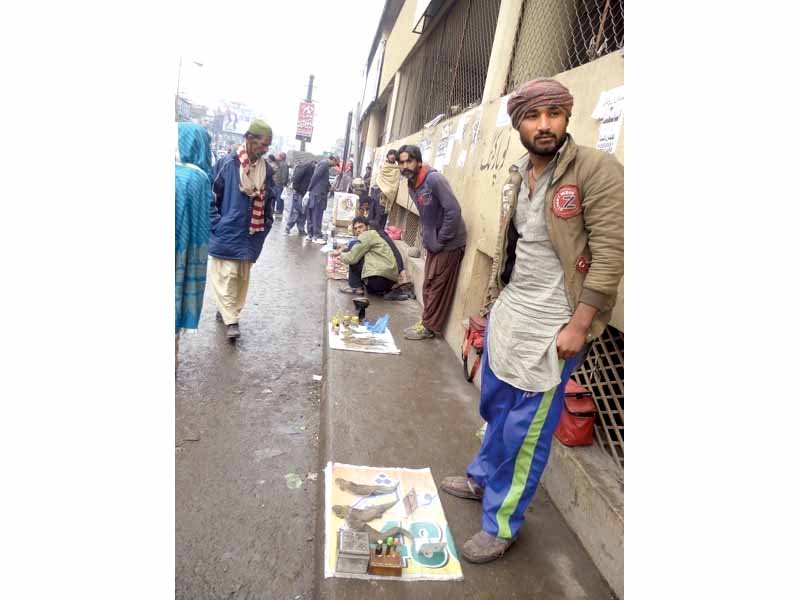
Lying in a supine position at a roadside stall, around a dozen wild lizards looked unconscious or dead, but the harsh reality behind this strange position of the reptile is their back bones are broken by the captors so these creatures are unable to escape.
The vendors, who are mostly quacks, set up stalls in different commercial areas and make their attempts at convincing passers-by to buy oil extracted from lizard skin and try to pass it off as multi-purpose healing ointment, which serves as a cure for back pain, joint pains and also a cure for impotency.
The most brutal and grisly act in selling `Sanda oil’ practice is witnessed when the quack gets an order for oil, he cuts the stomach of the already hurt reptile and puts the corpse in a heated fry pan after removing its internal organs.
The oil obtained after burning of the corpse is sold for a meagre amount of Rs100 per 10 grams.
The unsympathetic captor does not have any idea about the cruelty he is inflicting upon the harmless reptile just for the sake of a small amount of money and that too in the name of such a deceptive practice.
However the vendors themselves have an entirely different perception on the practice. The very same act that is seemingly cruel and deceptive to some, is the vendors’ primary source of income and a means of survival. Instead of perceiving it as a malicious act, they see it as earning their livelihood.
“This is our profession, we catch these reptiles with great difficulty and sell the oil extracted from their skin,” says a vendor while talking to a correspondent, “we are poor people and this is our only source of earning through which we fulfil our household needs,” he argued in response to a question about callousness of the practice.
“For our own survival we have to do this because we have no option,” the vendor continued.
Furthermore, senior officials went on to announce that it is an illegal act, reiterating the cruelty involoved in it. “This is a very cruel practice which is not only prohibited but punishable under Khyber Pakhtunkhwa’s Wildlife and Biodiversity Act 2015,”observed Wildlife Extension KP Divisional Forest Officer (DFO) Niaz Muhammad.
The practice is also in violation of `Prevention of Cruelty to Animals Act 1890’, Niaz stated, further adding that the creature used is a spiny-tailed lizard, a brown reptile, and is mostly found in desert areas of Punjab and Sind provinces.
The captors break the back bones of the lizard because of its agility and to prevent its escape. Its Vertebrate column is broken by hitting it with a hammer and bending its backbone.
“It is a very painful activity and is prevalent across the country and needs to be stopped,” stated WWF Focal Person Hamera Aysha. She urged the media to play its role in curbing this ruthless practice and for saving wild species from brutal killings.
“In a recent hearing when a lizard captor was arrested by the Wildlife department, he was presented in the court of a Senior Civil Judge Abbotabad, the Judge remarked that he wanted to break the captor’s fingers so that he would realise the pain being felt by these reptiles,” informed Wildlife Abbotabad Division, Senior Divisional Forest Officer Abdul Rasheed.
The captor, Nawab from Pakpattan, had brought 204 lizards to Abbotabad for supplying to a quack, Abdul Rasheed told APP.
The honourable judge was so angry over the cruel practice that he directed for sending the captor to jail and refused bail application, he informed.
SDFO Abbotabad said the Wildlife department seized the lizards from a public transport near Havelian on March 8, 2018. Another raid was conducted in Abbotabad district and 10 more lizards were seized from the quack.
Despite being rescued from the clutches of the vendors, these lizards cannot be released into the wild because their backbones are broken and it would be impossible for them to survive in their natural habitat.
According to Wildlife Department rules the captor has to first pay a Rs3,000 fine for each lizard. A total of 204 lizards would cost Rs612,000.
After making the payment the perpetrator can be charged with a fine of Rs45,000 by the court. Rasheed added that in case the captor fails to submit the penalty and price of lizard, he can face imprisonment as decided by the court.
Wildlife department is keeping a strict watch over the practice and arresting anyone found in such business, Naiz added.
It merits a mention here that apart from street vendors, sale of Sanda oil is also available on social media websites including Facebook.
“Sanda oil is a patent Ayurveda medicine for a blissful and happy life, stress free mind, good health and cool life style,” reads an ad posted on the website of a beauty salon offering free home delivery of 12 gram of Sanda oil in Pakistan at a price of Rs749.
The website also claims that Sanda oil does not have any side effect if administered properly and with right dosage of oil application.
“The concerned Wildlife departments should take action against sale of Sanda oil on social media,” observed WWF-Pakistan Field Manager Saeed ul Islam. He further added that the claims about Sanda oil curing muscular pains or other diseases are all myths, and that most of its buyers are illiterate people who are easily deceived by quacks.
Published in The Express Tribune, April 2nd, 2018.











COMMENTS
Comments are moderated and generally will be posted if they are on-topic and not abusive.
For more information, please see our Comments FAQ